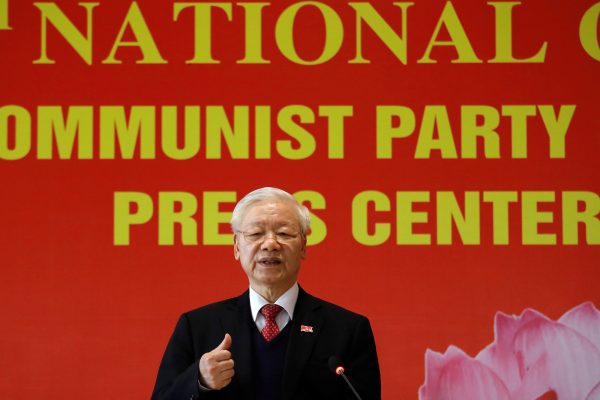Before the Congress, the continuity of the CPV’s high-profile anti-corruption campaign led by Secretary-General Nguyen Phu Trong, who was expected to step down due to his advanced age and ailing health, was unclear. But Trong beat the odds when he was re-elected for a third term, despite his election breaching CPV rules. Having handed over the presidency to former prime minister Nguyen Xuan Phuc, Trong is now free to focus on fortifying Party power with one hand, while fighting corruption and cleaning up the Party on the other.
Chairperson of the Central Anti-Corruption Steering Committee since 2013, Trong christened Vietnam’s anti-corruption drive, Dot Lo (or furnace firing). Trong’s efforts over the past eight years earned him a reputation as the great furnace firing man. Never before in the 91-year history of the CPV have so many officials been disciplined, expelled from the Party or imprisoned in connection with corruption.
By the end of 2020, more than 11,700 economic crime cases were investigated, prosecuted and brought to court for first-hearing trials. This included 1900 corruption cases involving 1400 suspects. More than 800 people, including one incumbent member of the Politburo, seven former and incumbent members of the central committee, four formers and incumbent ministers and seven military and police generals — linked to nearly 90 corruption and economic wrongdoing cases — have been convicted.
Speaking at a press conference following the conclusion of the 13th Congress, Trong said the corruption fight so far should be considered an ‘initial containment and prevention’ strategy and will face future challenges.
Combating corruption in Vietnam’s one-party state is not simple and it is seen as a threat to the CPV regime’s survival. It is entangled with institutional structures in which Party rules override the constitution and law, and legal courts follow the Party’s decisions. Corruption cases, particularly those defined by the CPV as ‘grand cases’, are often linked to interest groups which have political influence and are possibly associated with regime figures at the top level. Trong likened combating corruption to beating mice without breaking the vase.
Public attention is being drawn to how Trong and the new 18-member Politburo will decide on the fate of the ‘three big fish’ and former members of the Politburo: former party boss of Hanoi Hoang Trung Hai, former party boss of Ho Chi Minh City Le Thanh Hai and former governor of the State Bank of Vietnam Nguyen Van Binh. All three men were disciplined last year.
Prior to the 13th Congress, Hoang Trung Hai and Binh were sent warnings, preventing them from being re-elected to the new Politburo. Le Thanh Hai was dismissed from his position of Secretary of Ho Chi Minh City Party Committee for the 2010–2015 tenure.
Hoang Trung Hai was held accountable for the direction given during his time as deputy prime minister to a cooperation project between Thai Nguyen Iron and Steel Joint Stock Company and the Metallurgical Corporation of China, which caused a loss of hundreds of millions of dollars. Rumours say Trong has not been able to punish Hoang Trung Hai because of his Chinese ancestral origin and connection with authorities in Beijing. In his role as the state bank governor, Binh made unlawful and contradictory decisions against government rules, causing huge losses for the state’s revenues.
Both Hoang Trung Hai and Binh were members of the cabinet headed by notorious former prime minister Nguyen Tan Dung. Without Dung’s approval and back-up, Hai and Binh would not have committed these wrongdoings. Before or after making important decisions as cabinet members, Hai and Binh consulted and reported to Dung. Punishing them further would be challenging for Trong.
Nicknamed the ‘Godfather of Ho Chi Minh City’, Le Thanh Hai was involved in a multi-billion dollar property development project, responsible for many thousands of residents living in miserable conditions. Hai’s deep network in the public and private sector, especially the Chinese–Vietnamese business community which some believe acts as a ‘hidden power force’, have a strong influence on Ho Chi Minh City’s economy.
Trong’s Dot Lo campaign has failed to punish Hai for this reason, though some signs suggest he will not give up. On 7 April 2021 at a meeting chaired by Trong, the CPV Secretariat expelled Hai’s close ally, Tat Thanh Cang from the Party after he was arrested and detained in 2020.
Trong has repeatedly vowed to combat corruption. Having handed over the presidency to Phuc, he now has free hands to do so. But only time will tell whether Trong will be able to catch the three big fish.
Hai Hong Nguyen is an Associate Researcher at the Centre for Policy Futures, Faculty of Humanities and Social Sciences, University of Queensland.


>Nicknamed the ‘Godfather of Ho Chi Minh City’, Le Thanh Hai was involved in a multi-billion dollar property development project, responsible for many thousands of residents living in miserable conditions. Hai’s deep network in the public and private sector, especially the Chinese–Vietnamese business community which some believe acts as a ‘hidden power force’, have a strong influence on Ho Chi Minh City’s economy.
After 2009, Ho Chi Minh City’s economy as well as the whole Southern economy has fallen under Northern Vietnamese control. Chinese Vietnamese communities barely have any economic power anymore aside of “looking-good-articles” of Showbiz world of Vietnamese media. Every important real estate asset and business in the South are in the hands of Northern Vietnamese private elites or Communist officials.
Chinese Vietnamese businesses and Southern Vietnamese businesses are losing their grip on the Southern economy permanently. Their only power is now the mass media empire where the South is the most powerful but I doubt that it can last long.